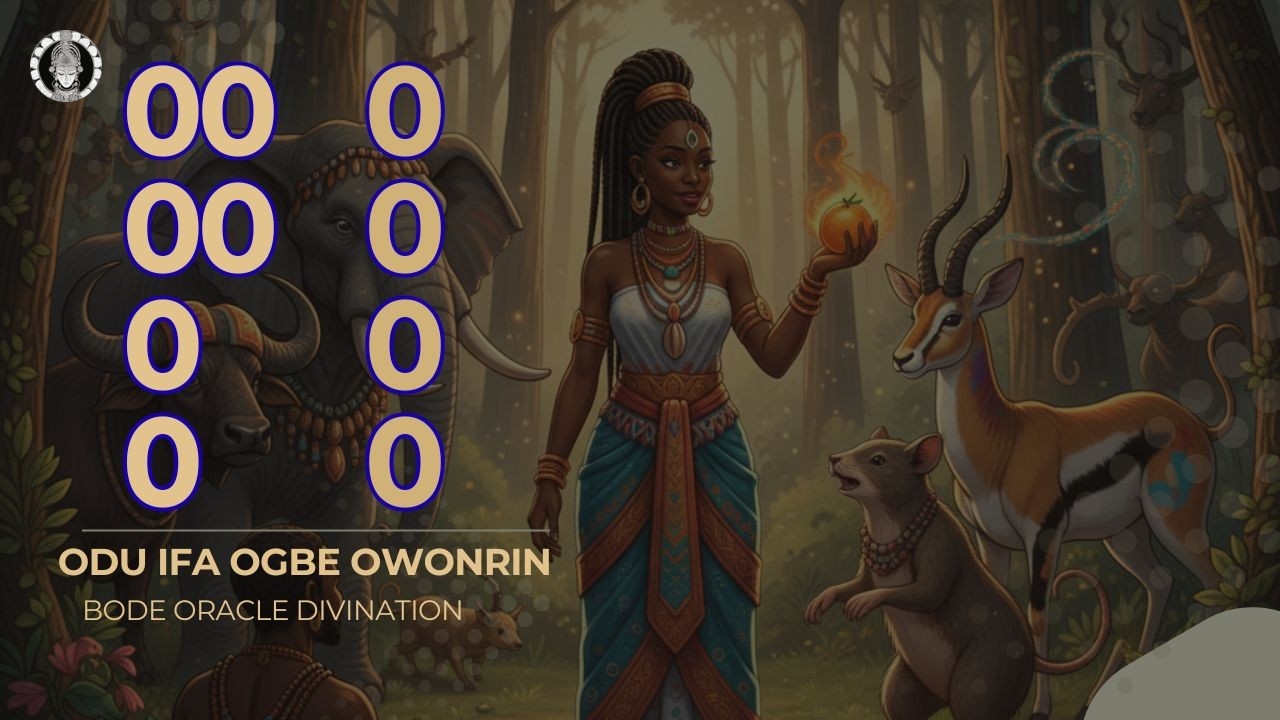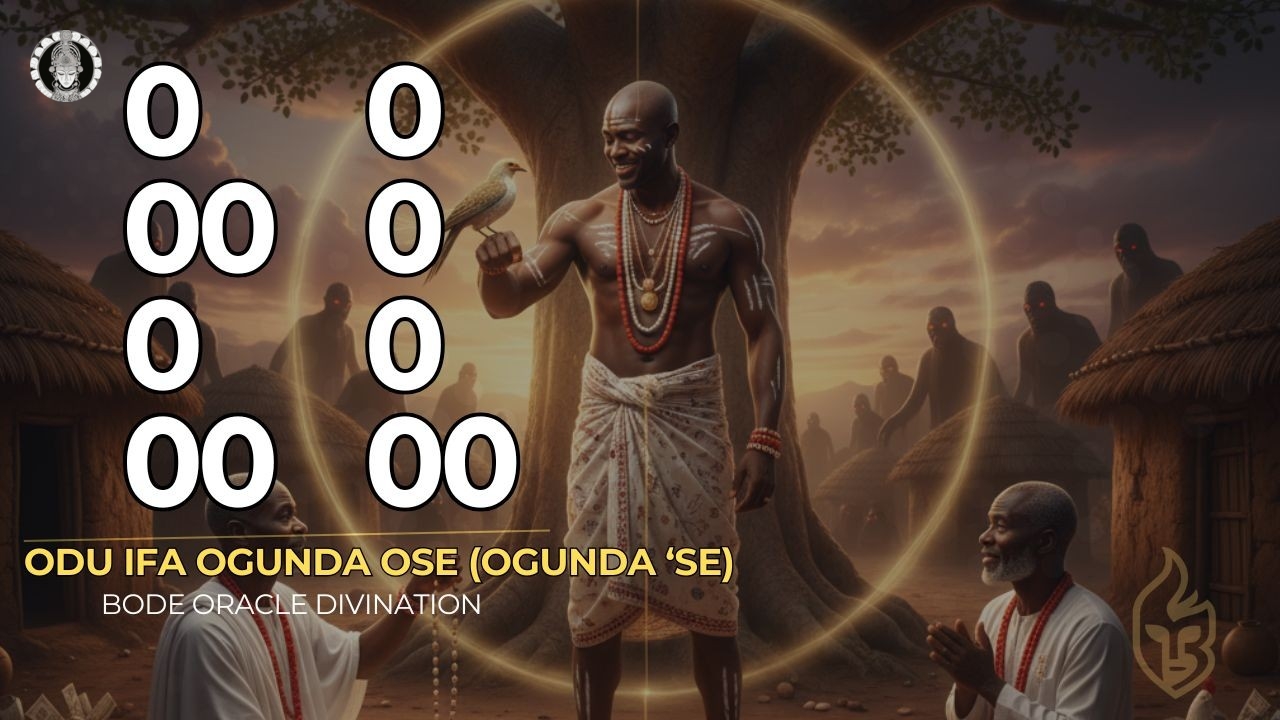Introduction to Odu Ifa Ogunda Ose (Ogunda Se)
Odu Ifa Ogunda Ose, also known as Ogunda Se, represents one of the 256 sacred divination signs in the Ifa corpus. This powerful Odu carries profound messages about divine connections—finding the right people at the right time, the blessing of childbirth after prolonged waiting, prosperity that comes through travel and spiritual mission, and the transformative power of proper spiritual practice that turns pain into joy. Through the wisdom of Ogunda Ose, we learn that Ifa serves as the ultimate connector, linking those who seek with what they need, and guiding us to our destined encounters and blessings.
The divinations within Ogunda Ose revolve around the figure of Lebe—the great healing bird described as "Eye arasan" (the bird that cures things). Lebe appears repeatedly, teaching that certain problems require not just any solution but the right solution from the right source. This Odu emphasizes that when we are searching—whether for people, answers, healing, or blessings—Ifa provides the spiritual compass that points us in the correct direction, eliminating wasted effort and false connections. For comprehensive understanding of Ifa as a complete divination and knowledge system, explore documented scholarship on this ancient tradition.
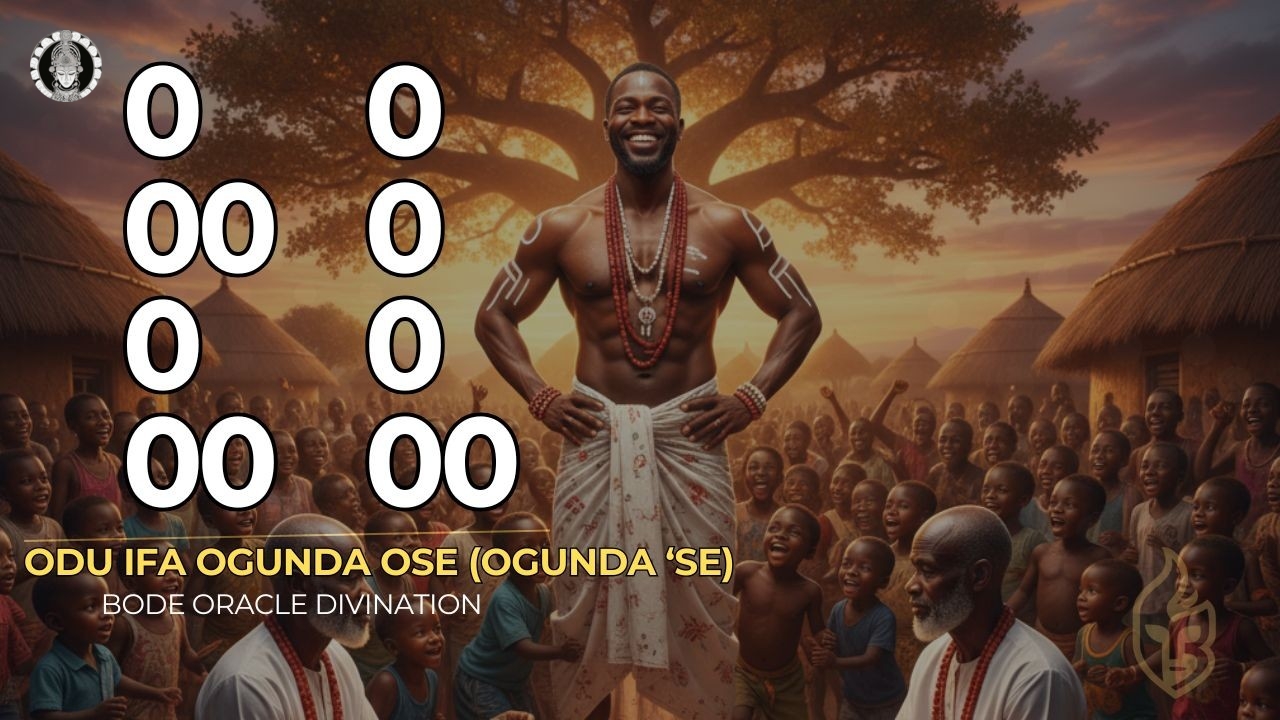
Ifa Divination for Lebe: Finding the Right Person Without Problems
The Universal Search for Right Connections
This foundational divination from Ogunda Ose addresses one of life's most common yet critical challenges—finding the right person. Whether seeking a business partner, spouse, healer, teacher, employee, or any significant connection, the success of our endeavors often depends on connecting with the right individuals. Ifa reveals that Lebe was actively searching and trying to make things work (waya rasan rokun), experiencing the frustration that comes when effort alone cannot produce the desired result.
What makes this divination particularly powerful is Ifa's promise that through prescribed sacrifice, not only will the person be found, but there will be no problems or complications with them. This teaching eliminates the common experience of finally finding someone only to discover they were not the right fit. Ifa's guidance ensures both location and compatibility, both discovery and harmony.
The Imagery of Bitter Leaves
The opening lines reference numerous bitter leaves (ewuro) that always taste bitter (lokoro jogbojogbo bioroo). This metaphor teaches that some experiences remain consistently challenging without divine intervention. Just as bitter leaves cannot become sweet through human effort alone, certain searches and struggles require spiritual resolution rather than merely increased effort. The repetitive nature of bitterness represents the cycle of failed attempts that only proper sacrifice can break.
The Sacred Verse in Yoruba
Inanimunrinpon eyin ni o fibi eeyi rodorodo wole
Igba ewuro lokoro jogbojogbo bioroo
Adifafun lebe
Tii waya rasan rokun
Ebo won ni o se
O si gbebonibe orubo
Nje lebe momo de
Eye arasan
Awarirawa awo nyo
English Translation
Inanimunrinpon eyin ni o fibi eeyi rodorodo wole
The numerous bitter leaves that always taste bitter
Ifa divination was cast for Lebe
Who was struggling and trying to make things work
He was asked to offer the sacrifice
And he complied
Therefore, Lebe has truly arrived
The great bird that cures things
We have met and we are content
Lebe as the Great Healing Bird
The description of Lebe as "Eye arasan" (the great bird that cures things) is profoundly significant. In Yoruba cosmology, birds represent messengers between heaven and earth, carriers of spiritual solutions to earthly problems. Lebe's characterization as a healing bird teaches that the right connection brings not just companionship but healing, not just presence but transformation. When we find the right person through Ifa's guidance, that connection itself becomes medicine for our struggles.
The phrase "awarirawa awo nyo" (we have met and we are content) captures the peace that comes from divine connection. This is not mere satisfaction but deep spiritual contentment—the recognition that what has been found is exactly what was needed. This stands in stark contrast to human connections made without spiritual guidance, which often bring complications even after initial success.
Prescribed Offerings (Ebo)
For finding the right person without problems, Ifa prescribes a rooster (akuko adie), hen (agbebo adie), pigeon (eyele), and money (opolopo owo). The rooster represents announcement and the breaking of dawn—symbolizing that the search is ending and the answer is coming. The hen represents nurturing and the domestic harmony that follows right connections. The pigeon represents peace and the gentle, harmonious nature of the relationship to come. Together, these offerings create spiritual conditions that attract the right person while repelling wrong connections. Understanding Ifa divination as artistic expression of Yoruba knowledge provides deeper context for these symbolic prescriptions.
Modern Application for Finding Right Connections
In contemporary contexts, this divination speaks to anyone in the process of searching—job seekers looking for the right employer, entrepreneurs seeking business partners, singles seeking life partners, patients seeking the right healer, students seeking mentors, or anyone pursuing significant connections. The divination promises that Ifa's intervention eliminates false starts, incompatible matches, and wasted time, directing the seeker straight to their destined connection.
Ifa Divination for Baba Opara Iragaja: The Blessing of Childbirth
The Pain of Childlessness
This divination from Ogunda Ose addresses one of the deepest human sorrows—the longing for children that remains unfulfilled. Baba Opara Iragaja is described as crying for children (momi oju sogbere omo), experiencing the profound grief that comes from watching time pass without the blessing of offspring. In Yoruba culture, as in many African traditions, children represent continuity, legacy, and the fulfillment of one's purpose. Childlessness is therefore not merely a personal disappointment but a spiritual crisis requiring intervention.
What makes this divination particularly hopeful is its promise that the situation can be completely reversed through proper sacrifice. The phrase "kee pe, kee jina" (not too long, not too short) indicates that the blessing will manifest in appropriate timing—neither delayed nor premature, but arriving precisely when spiritual conditions align.
The Principle of Like Attracts Like
The verse establishes a profound spiritual principle through repetition: "Ogunda se ori eku ni peku wa, Ogunda se ori eja ni n paja wa, Ogunda se ori eran ni n peranwa" (Ogunda is the destiny of the rat that calls rats, the destiny of fish that calls fish, the destiny of goats that calls goats). This teaches that our spiritual frequency and alignment determine what manifests in our lives. Just as each animal attracts its own kind, proper spiritual alignment with fertility energies attracts the blessing of children.
This principle extends beyond childbearing to all areas of life—those aligned with wealth attract wealth, those aligned with healing attract health, those aligned with wisdom attract knowledge. The repetition of three different animals (rat, fish, goat) emphasizes the universality of this spiritual law across all creation.
The Sacred Verse in Yoruba
Ogunda se ori eku ni peku wa
Ogunda se ori eja ni n paja wa
Ogunda se ori eran ni n peranwa
Adifafun baba o para iragaja
Ti n momi oju sogbere omo
Ebo won ni o se
O si gbebo nibe orubo
Kee pe
Kee jina
E wa ba ni ni jebutu omo
English Translation
Ogunda is the destiny of the rat that calls rats
Ogunda is the destiny of the fish that calls fish
Ogunda is the destiny of the goats that calls goats
Ifa divination was cast for great father called O para iragaja
Who was crying for children
He was asked to offer the sacrifice
And he complied
Not too long
Not too far
Come and rejoice with me for the blessing of having children
The Simplicity of the Prescription
Notably, this divination prescribes only a hen (aboadie) and money (opolopo owo). The hen, as a female bird that lays eggs and nurtures chicks, directly symbolizes fertility and motherhood. The simplicity of the prescription teaches that fertility blessings do not require elaborate or expensive sacrifices but rather proper spiritual alignment and compliance. The hen represents the principle of multiplication—one bird produces many eggs, just as the blessing of one child often leads to multiple children.
Prescribed Offerings (Ebo)
For those seeking the blessing of children, Ifa prescribes a hen (aboadie) and money (opolopo owo). The hen should be offered with specific prayers invoking fertility, asking that just as the hen produces eggs abundantly, so too will the person produce children. The money facilitates the practical aspects of childbearing and child-rearing, ensuring that when children come, resources are available to support them.
Contemporary Relevance for Fertility Challenges
This divination speaks to modern couples facing infertility, whether due to medical conditions, advanced age, or unexplained causes. It teaches that while medical intervention has its place, spiritual alignment is equally or more critical. The divination does not promise immediate conception but assures that proper sacrifice creates the spiritual conditions necessary for children to come "not too long, not too short"—in perfect timing.
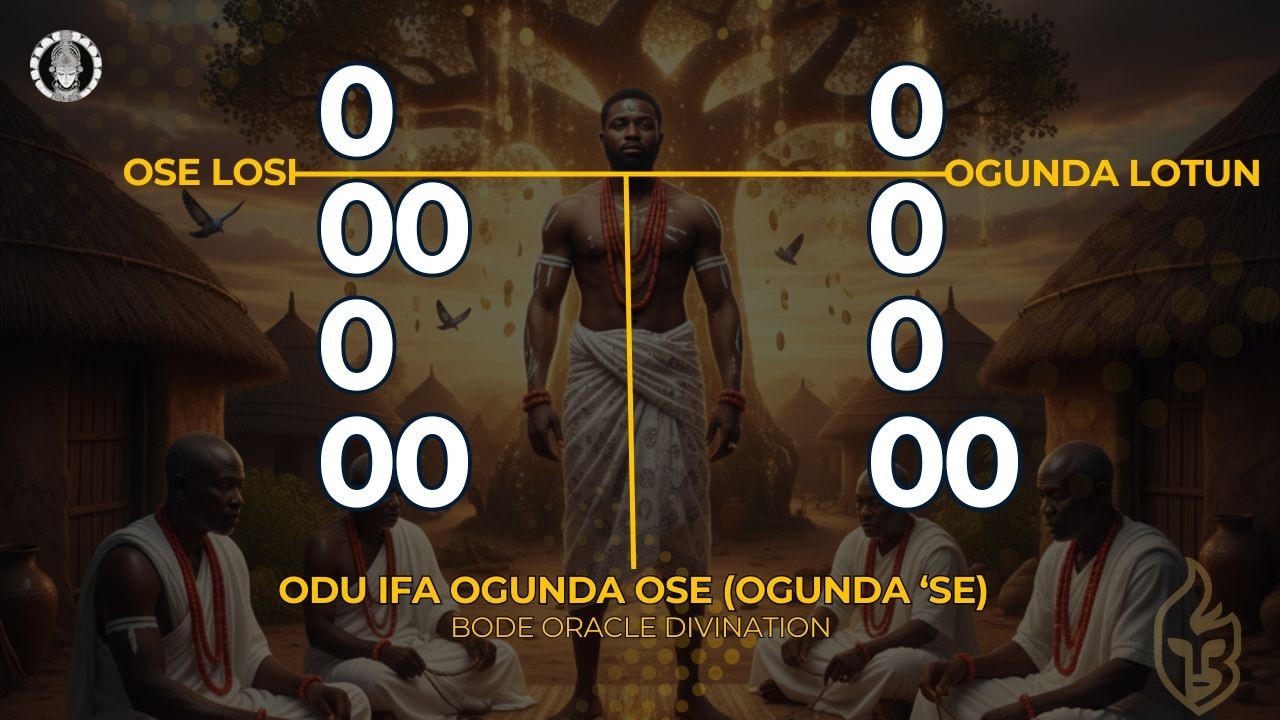
Ifa Divination for Olubojo: Prosperity Through Spiritual Mission
The Essential Priest
This divination from Ogunda Ose introduces Olubojo, described emphatically as "awo rere" (very good priest). The verse states "Bao rolubojo, Ao saye olubojo aworere" (If we have not seen Olubojo, we cannot make things right—Olubojo is a very good priest). This teaches a profound truth: certain blessings and solutions require specific spiritual practitioners. Not all priests can address all problems; sometimes only the right priest can facilitate the needed breakthrough.
Olubojo's mission to Ila town represents the importance of taking one's spiritual gifts to where they are needed. The divination reveals that prosperity comes not from remaining in familiar territory but from answering the call to serve in designated places. This principle applies to all who possess skills or gifts—fulfillment and abundance come through deploying those gifts where they can make the greatest impact.
The Mystery of Igbo Nla
The opening line "Igbo nla ni o se di awonka" carries mystical significance. While the literal translation may be obscure, it represents the type of sacred knowledge and incantations that accompany high-level Ifa practice. Some spiritual formulas work not through rational understanding but through vibrational power. This teaches that not all spiritual truth is meant for intellectual analysis; some knowledge operates on frequencies beyond normal comprehension.
The Sacred Verse in Yoruba
Igbo nla ni o se di awonka
Adifafun olubojo
Tii se awo rode ila
Ebo won ni o se
O si gbebo nibe orubo
Nje olubojo awo rere
Bao rolubojo
Ao saye olubojo aworere
English Translation
Igbo nla ni o se di awonka
Ifa divination was cast for Olubojo
Who was on priestly mission to the town of Ila
He was asked to offer the sacrifice
And he complied
Therefore, Olubojo, you are a very good priest
If we have not seen Olubojo
We cannot make things right
Olubojo is a very good priest
The Importance of Pre-Journey Sacrifice
This divination emphasizes that Olubojo must offer sacrifice before embarking on his journey (korubo ko to lo). This teaches a critical principle: preparation precedes manifestation. The sacrifice before travel creates spiritual conditions that ensure the journey produces desired results. Without pre-journey sacrifice, even the most qualified priest traveling to the right place may not achieve success. This demonstrates that spiritual preparedness is as important as skill or destination.
The promise that he will return with "the blessing of goodness" (ki o le ba ko ire bo ni be) shows that properly prepared travel brings back not just material gain but comprehensive blessing—reputation, connections, prosperity, and spiritual advancement. This distinguishes sacred travel from ordinary movement; one transforms the traveler while the other merely relocates them.
Prescribed Offerings (Ebo)
For prosperity through travel and mission work, Ifa prescribes a pigeon (eyele), rooster (akuko adie), hen (agbeboadie), and money (opolopo owo). The combination of birds represents different aspects of successful travel: the pigeon for peace and safe passage, the rooster for authority and recognition in the new place, the hen for grounding and establishing roots, and money for practical needs and the ability to serve effectively. For understanding the cultural significance of Ifa among Yoruba people, UNESCO documentation provides valuable context.
Modern Application for Professional and Spiritual Missions
This divination speaks to modern professionals traveling for work, missionaries going to new territories, teachers taking positions in different locations, healers establishing practices in new areas, or anyone whose prosperity requires strategic relocation. It teaches that success comes not just from going but from going properly prepared spiritually, and not just to any place but to the place where one's gifts are most needed.
Ifa Divination for Lebe's Journey: Transforming Pain Into Joy
The Long Journey and Its Purpose
This second appearance of Lebe in Ogunda Ose presents a different aspect of this figure's mission. Here, Lebe travels "mola san rokun" (to a very far place), emphasizing that sometimes solutions require us to go beyond familiar territories. The distance is not merely geographical but spiritual—representing the gap between current suffering and destined blessing, between present pain and future joy.
The opening invocation "Ogunda lawo alase, Ela roro lela tosumore" (Ogunda is the priest of Alase, the complete lightning from the moon) connects this Odu to powerful cosmic forces. Lightning represents sudden, transformative power, while the moon represents cycles, feminine energy, and the hidden influences that shape visible reality. This teaches that transformation often comes suddenly after periods of waiting, and that divine intervention operates through both visible and invisible channels.
The Central Teaching: Seek Lebe First
The verse states "Taba n wa molasan rokun, Omo lebe mo papoju" (If one is seeking goodness, one must first seek Lebe). This establishes Lebe not just as a character in stories but as a principle: when seeking solutions, healing, or blessings, one must first identify and connect with the right source. The name Lebe may represent any qualified spiritual practitioner, healer, or guide who possesses the specific knowledge needed for one's situation.
This teaching addresses a common mistake—seeking solutions from any available source rather than identifying the right source. Just as not every doctor can treat every illness, not every spiritual practitioner can address every spiritual challenge. Wisdom lies in seeking the right helper, not just any helper.
The Sacred Verse in Yoruba
Ogunda lawo alase
Ela roro lela tosumore
Adifafun lebe tiwa mola san rokun
Ebo won ni o se
O si gbebo nibe orubo
Nje taba n wa molasan rokun
Omo lebe mo papoju
English Translation
Ogunda is the priest of Alase
The complete lightning from the moon
Ifa divination was cast for Lebe
Who was going to a very far place
He was asked to offer the sacrifice
And he complied
Therefore, if one is seeking goodness
One must first seek Lebe
Pain Transformed Into Joy
The Ase (spiritual activation) for this divination reveals its deepest purpose: addressing those experiencing pain related to childbirth struggles (oju omoni pon eleyi). The promise is profound—"ki idamunre o le jasi ayo" (so that your pain may turn to joy). This teaching extends beyond literal childbirth to all forms of suffering. It demonstrates that pain is not a permanent state but a transformable condition.
The transformation occurs not through time alone but through proper spiritual intervention. Just as Lebe's long journey required sacrifice for success, those experiencing prolonged pain must perform prescribed sacrifices to catalyze transformation. The pain itself becomes the raw material that, through spiritual alchemy, transforms into its opposite—joy.
Prescribed Offerings (Ebo)
For transforming pain into joy, particularly regarding childbirth, Ifa prescribes a hen (agbeboadie), pigeon (eyele), rooster (akuko adie), and money (opolopo owo). The hen represents fertility and nurturing, the pigeon represents peace and the end of struggle, the rooster represents the announcement of victory and the breaking of dawn after night, and money ensures practical support for the blessing to manifest and be sustained.
The Broader Principle of Transformation
While this divination specifically addresses childbirth pain, its principle applies universally: whatever causes tears can become the source of celebration through proper spiritual work. Financial struggle can transform into prosperity, relationship pain into harmonious union, illness into health, confusion into clarity. The key lies in performing prescribed sacrifices with faith and patience, trusting that Ifa's prescriptions contain the power to catalyze complete transformation.
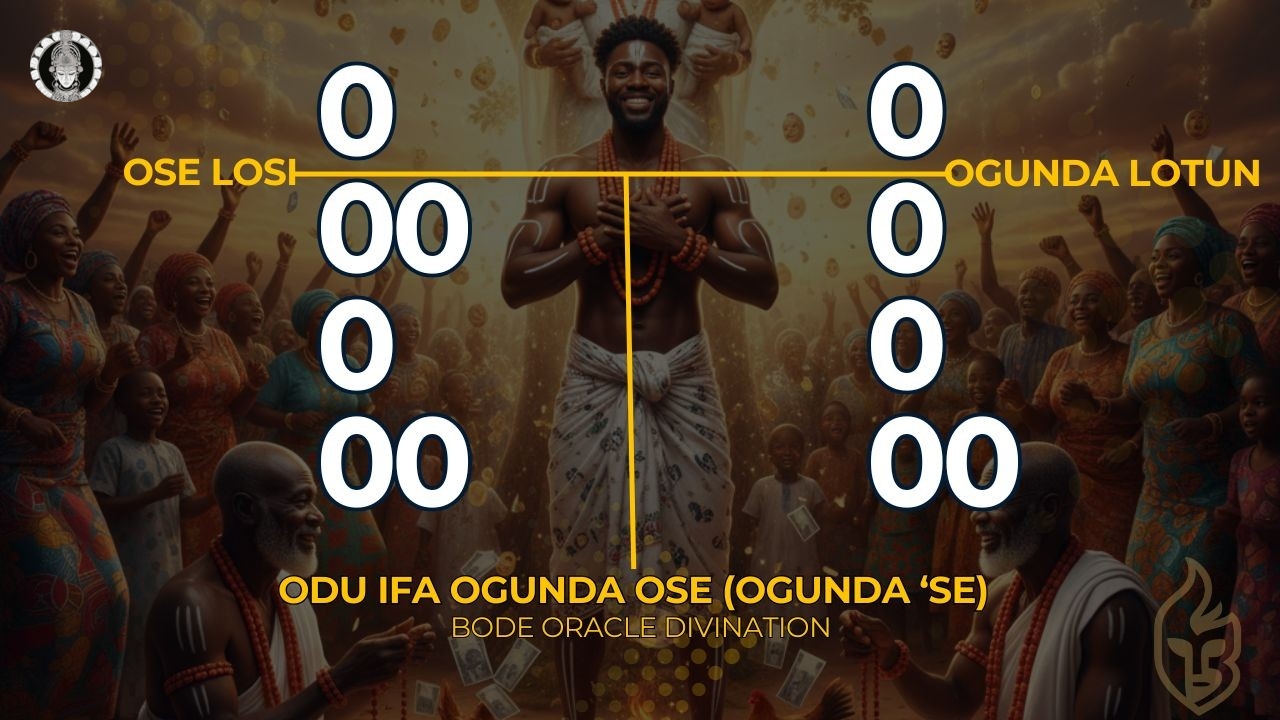
Akose Preparations of Ogunda Ose
Understanding Specialized Spiritual Medicine
Beyond direct sacrifices to spiritual forces, Ogunda Ose provides two specific spiritual preparations that work through different mechanisms. Akose Awure Ola attracts wealth through internal transformation, while Akose Isegun Ota provides victory through purifying the head—the seat of destiny in Yoruba cosmology. Together, they address both material prosperity and spiritual triumph.
Akose Awure Ola: Wealth Through Fish Preparation
This preparation uses iyun herbs ground and cooked with three ojiji fish and three aro fish, palm oil, and salt. The person must consume everything once fully cooked. Fish in Yoruba spirituality represents wealth that flows and multiplies. Unlike land animals that remain in one place, fish move through water—symbolizing wealth that circulates and increases. The number three appears twice (three ojiji, three aro), representing completeness and the manifestation of spiritual intention into physical reality.
Yoruba Text and Translation
Yoruba: Ewe iyun eye ao lo ao fi se eja ojiji meta eja aro meta lepo niyo ti o ba tiji nan ao kaje.
English: Iyun herbs are ground together and used to cook three ojiji fish, three aro fish with palm oil and salt, and when fully cooked, one eats them all.
The Significance of Complete Consumption
The instruction that the person must eat everything (ao kaje) is critical. Partial consumption produces partial results. By consuming all the prepared fish, the person internalizes the wealth-attracting properties completely. This transforms the person's internal spiritual composition to naturally attract and multiply prosperity. The fish become part of the person's body, making wealth attraction an inherent quality rather than an external pursuit.
Spiritual Properties of the Ingredients
Iyun herbs carry cooling and attraction properties. Ojiji fish represents quick-moving wealth that comes suddenly. Aro fish represents sustained, steady prosperity. Together, they ensure wealth comes both quickly and sustainably. Palm oil provides smoothness and removes obstacles to wealth flow. Salt represents preservation and the ability to maintain accumulated wealth rather than losing it as quickly as it comes.
Akose Isegun Ota: Victory Through Head Purification
This preparation combines kuku corn stalk and akerejupon root, burned together and mixed with black soap specifically for washing only the head. The head (ori) in Yoruba cosmology is simultaneously the physical head, one's personal destiny, and one's spiritual consciousness. By treating the head with this powerful preparation, one purifies destiny itself and empowers consciousness to recognize and seize opportunities for victory.
Yoruba Text and Translation
Yoruba: Kuku agbado odun tolo egbo akere jupon ao jopo mo ara won ao wa po mo ose ao ma fiwe ori ni kan.
English: The kuku corn stalk and akerejupon root will be burned and mixed with black soap and used only to wash the head.
Why Only the Head?
The specification that this preparation is used only for the head (fiwe ori ni kan) is significant. The head receives information, makes decisions, and houses consciousness. By purifying only the head, the preparation works on mental clarity, spiritual perception, and decision-making capacity—all essential for recognizing and achieving victory. This targeted approach demonstrates that not all spiritual work requires total body treatment; some victories require specifically transformed consciousness.
The Power of Burned Ingredients
Burning the corn stalk and root transforms them from their natural state into spiritual essence—ash that carries concentrated power without physical density. This process represents purification through fire, one of the most potent transformative forces in African spirituality. The ash mixed with black soap creates a medium that simultaneously cleanses (soap) and empowers (ash), removing obstacles while implanting victory consciousness. For scholarly perspective on Ifa divination within African Traditional Religions, academic resources provide comprehensive context.
Important Considerations for Both Preparations
Both Akose preparations must be performed under the guidance of a qualified Babalawo who knows the proper incantations and can ensure correct procedures. The spiritual power comes not just from the materials but from the prayers and invocations that accompany preparation and use. These preparations should only be undertaken when divination specifically prescribes them, as their power is meant for particular spiritual circumstances rather than general use.
Additional Resources
Internal Links
- Complete Guide to Ogunda Ose - Detailed information and practices
- Bode.ng Blog - Extensive collection of Ifa and Yoruba spirituality articles
- Complete Odu Ifa Directory
- Bode Oracle - Main portal for divination services and community
External Resources
- African Traditional Religions: Ifa Divination - Duquesne University
- Ifa Divination System - Wikipedia
- Ifa of the Yoruba People of Nigeria - UNESCO
- Ifa Divination System: An Artistic Expression of Yoruba Knowledge Creation
- UNESCO Recognition of Ifa Divination System
- Algebraic Characterization of Ifa Main Divination Codes
Connect With Us on Social Media
- BODE Oracle on TikTok
- BODE Oracle on YouTube
- BODE Oracle on Facebook
- BODE Oracle on X (Twitter)
- BODE Oracle on Pinterest
Visit Bode.ng to explore more divination teachings, participate in quizzes and polls, and connect with our community of practitioners and learners. Register today to access exclusive content and personalized guidance on your spiritual journey.
Frequently Asked Questions And Answers About Odu Ifa Ogunda Ose (Ogunda Se)
Find answers to common questions about this sacred Odu Ifa and its divination teachings
Ogunda Ose, also called Ogunda Se, is one of the 256 sacred Odu (divination signs) in the Ifa corpus. It carries powerful messages about finding the right people and connections, fertility and childbirth blessings, prosperity through travel and mission work, and the healing power of proper spiritual practice. This Odu teaches that through proper sacrifice and seeking divine guidance, one can locate the right people, bear children, and transform pain into joy.
Lebe appears multiple times in Ogunda Ose as the great healing bird and spiritual practitioner. Described as 'Eye arasan' (the bird that cures things), Lebe represents divine intervention that brings solutions to seemingly impossible problems. The divination teaches that when seeking goodness or solutions, one must first seek Lebe—symbolizing the importance of finding the right spiritual guide or healer who can facilitate transformation and blessing.
Ogunda Ose contains powerful divinations for those seeking children. The story of Baba Opara Iragaja demonstrates that even prolonged childlessness can be reversed through proper sacrifice. The Odu uses the metaphor 'Ogunda is the destiny of rats that calls rats, fish that calls fish'—teaching that like attracts like, and proper spiritual work calls forth the blessing of children. Prescribed sacrifices include hen and money, transforming tears into joy.
The first divination in Ogunda Ose specifically addresses those searching for someone—whether a business partner, spouse, healer, or any significant connection. Ifa promises that through prescribed sacrifice (rooster, hen, pigeon, and money), the person will find who they seek without problems or complications. This teaches that divine guidance eliminates wasted effort and directs us to the right connections at the right time.
Multiple divinations in Ogunda Ose involve travel or mission work. Lebe's journey 'mola san rokun' (going to a very far place) and Olubojo's mission to Ila town demonstrate that prosperity often requires strategic movement. The Odu emphasizes offering sacrifice before embarking on journeys to ensure successful outcomes. This teaches that travel with proper spiritual preparation brings blessings that remaining at home cannot access.
The verse 'Ogunda is the destiny of the rat that calls rats, the destiny of fish that calls fish, the destiny of goats that calls goats' establishes the principle of spiritual attraction. This teaches that our spiritual frequency determines what manifests in our lives. Proper sacrifice and spiritual alignment attract corresponding blessings—those seeking children align with fertility energies, those seeking wealth align with prosperity forces.
Akose Awure Ola is a spiritual preparation using iyun herbs ground and cooked with three ojiji fish, three aro fish, palm oil, and salt. Once fully cooked, the person consumes everything. Fish in Yoruba spirituality represents wealth that flows and multiplies. The number three signifies completeness and manifestation. This preparation aligns the person's internal spiritual composition with wealth-attracting energies, ensuring prosperity flows naturally to them.
Akose Isegun Ota combines kuku corn stalk and akerejupon root, burned together and mixed with black soap for washing only the head. The head (ori) in Yoruba cosmology is the seat of destiny and consciousness. By treating the head with this powerful preparation, one purifies their destiny and empowers their consciousness to recognize and seize victory. This preparation works specifically on mental and spiritual clarity needed for triumph.
Olubojo is described as 'awo rere' (very good priest) whose presence is essential for things to work properly. The verse states 'if we have not seen Olubojo, we cannot make things right'—teaching that certain blessings require specific spiritual practitioners. Olubojo's mission to Ila town represents the importance of taking one's spiritual gifts to where they are needed, and the prosperity that follows authentic spiritual service.
The phrase 'ki idamunre o le jasi ayo' (so that your pain may turn to joy) appears in relation to childbirth struggles. Ogunda Ose teaches that pain and struggle are not permanent states but transformable conditions. Through proper sacrifice and spiritual work, the very thing causing tears becomes the source of celebration. This applies to all forms of suffering—childlessness, poverty, illness—all can be transformed through Ifa's prescriptions.
Birds, particularly Lebe described as 'Eye arasan' (the great healing bird), represent divine messengers and healers. Pigeons appear repeatedly in sacrifice prescriptions, symbolizing peace, gentle transformation, and spiritual communication. The bird imagery teaches that solutions often come from above—from spiritual realms—and that proper sacrifice creates channels for these blessings to descend and manifest in physical reality.
You can explore comprehensive information about Ogunda Ose through several resources:
- Complete Guide to Ogunda Ose - Detailed practices
- Bode.ng Blog - Extensive articles on Ifa spirituality
- Complete Odu Ifa Directory
- Bode.ng - Access divination services and community resources
Connect with us on social media for regular teachings: TikTok, YouTube, Facebook, X (Twitter), and Pinterest @BODEOracle.
